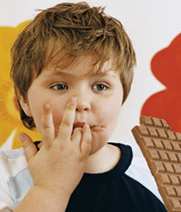- MENU
- HOME
- SEARCH
- WORLD
- MAIN
- AFRICA
- ASIA
- BALKANS
- EUROPE
- LATIN AMERICA
- MIDDLE EAST
- United Kingdom
- United States
- Argentina
- Australia
- Austria
- Benelux
- Brazil
- Canada
- China
- France
- Germany
- Greece
- Hungary
- India
- Indonesia
- Ireland
- Israel
- Italy
- Japan
- Korea
- Mexico
- New Zealand
- Pakistan
- Philippines
- Poland
- Russia
- South Africa
- Spain
- Taiwan
- Turkey
- USA
- BUSINESS
- WEALTH
- STOCKS
- TECH
- HEALTH
- LIFESTYLE
- ENTERTAINMENT
- SPORTS
- RSS
- iHaveNet.com: Health
Daryn Eller - Live Right Live Well

"It's just baby fat" -- so goes a common refrain among parents.
Maybe you've even said it about your own child.
But what is the statute of limitations on baby fat? And in light of the increase in childhood obesity, do you need to worry about your child's weight?
According to the Centers for Disease Control and Prevention (CDC), 17 percent of children ages 6 to 19 are obese -- double the rate of 20 years ago and triple for kids ages 12 to 19. Obese children run the risk of developing diabetes, high blood pressure and high cholesterol -- conditions that can lead to an early death. In fact, "some obese kids' cardiovascular systems look three times older than they are," says family physician Walt Larimore, M.D., a health educator and co-author of SuperSized Kids. What's more, obese children are more likely to experience social and psychological problems, such as stigmatization and poor self-esteem.
Unfortunately, study after study has found that parents often don't recognize when their children are dangerously overweight. "Parents don't see with objective eyes," says Dr. Larimore. "And so many kids today are overweight that overweight looks normal." If you suspect your child is flirting with obesity, get an objective assessment. Either have your child's pediatrician evaluate his weight or use a calculator to determine his Body Mass Index (BMI), a general indicator of body fatness based on height and weight. You can find an online BMI calculator programmed especially for kids and teens at the CDC's Web site (search "CDC kids BMI"). If the results indicate a problem, consider the following strategies to help your child trim down:
Be a good role model
Your child is more likely to eat healthfully if you do. "Fighting obesity needs to be a family affair, with everyone eating healthfully and being more physically active," says Jane Jakubczak, a registered dietitian and coordinator of nutrition services at the University of Maryland.
Make healthy food choices available
Kids used to eating lots of junk food may grumble when you start stocking your pantry with healthy, lower-calorie foods. But if you give them a choice of snacks, they may feel less deprived, because "you're still letting them have a choice and feel in control of what they're eating," says Jakubczak. So instead of just handing them an apple, give them a choice of an apple, yogurt, or cheese and crackers.
Let your child serve herself
Kids who serve themselves tend to dish out smaller portions, says Larimore. It can also help to use smaller-sized plates so portions look bigger and encourage your child to eat slowly so her brain has a chance to register the signals from her stomach that say, "I'm full."
Eat more home-cooked meals
Restaurant meals are generally higher in calories than home-cooked meals -- and that goes double for fast food joints. A 2004 study by USDA researchers found that eating fast food increases a child's daily intake by 187 calories, bumping up the risk of obesity.
Gradually slash screen time
Computer and TV time are generally what cuts into physical activity time, so limit viewing to an hour a day. If that's a big decrease for your child, reduce his screen time gradually. That may make it a little easier for him to accept the new house rules.
Make sure your child gets enough sleep
A review of studies in the journal Obesity found that the less sleep a child gets, the more likely he is to be obese. Children under 5 years of age should get 11 hours of sleep a night. Kids age 5 to 10 should get 10 hours, and age 11 and up, nine hours.
Take the focus off pounds
To encourage weight loss without denting your child's self-esteem, take the emphasis off pounds and talk about all the other benefits she'll get from eating healthfully and being active, says Jakubczak. A 5-year-old may be motivated knowing that fruits and vegetables will help her grow as tall as her big sister. A 10-year-old may respond to the idea that healthy choices will make her a better soccer player. When weight loss is beside the point, it will likely come more easily and without emotional pain.
Changing your child's eating and activity habits may seem challenging at first, but kids are adaptable, and it's worth the effort. The habits your child learns now will not only help him achieve a healthy weight in the short term, but they will give him the tools he needs to avoid obesity as he becomes an adult.
Daryn Eller has written for O, Prevention, Health and Natural Health magazines. She lives in Venice, Calif.
Copyright © All rights reserved.
AGING | ALTERNATIVE | AILMENTS | DRUGS | FITNESS | GENETICS | CHILDREN'S | MEN'S | WOMEN'S
Children's Health - Is Your Child Obese?